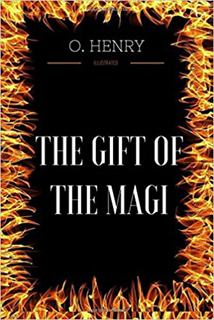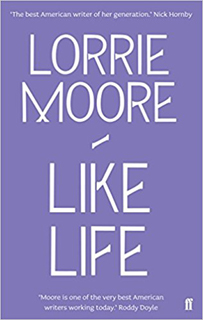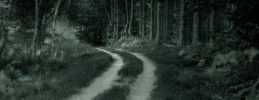
('New York City from Central Park on a cold, foggy night'© Hector A Parayuelos,2013)
SEASONAL WRITING, THEMES OF ISOLATION
By MARY O’DONNELL
The tendency to apply a layer of literary Rose Tint and Crimson Cordial to any seasonally set story is evident at this time of year, when newspapers and magazines commission well-known writers to compose a Christmas story. It will often be fanfared with words like ‘heart-warming’, ‘inspirational’, and ‘funny’. And here are two old reliables for a Halloween short story: ‘spooky’ and ‘chilling’.
 But I ain’t buyin’ it, and if you’re going to write a seasonal story, at least get salty about it and ask a few questions about how we process information today, and how the structure of tale-telling has changed in the past hundred years. One seasonal staple from the past, O.Henry’s ‘The Gift of the Magi’, is worth reading again if only to assess writing norms of that era. In this story, a virtuous but impoverished young couple sells the thing each values most, in order to buy a Christmas gift for one another – in the wife’s case, her hair, and in the husband’s, his gold watch. The irony is that the husband buys a set of much coveted hair combs for his wife with the money, while she gifts him a chain for his watch. The story is narrated in a fabular formal style, layered with a moral message on the value and grace of selfless acts and concludes with the following lines:
But I ain’t buyin’ it, and if you’re going to write a seasonal story, at least get salty about it and ask a few questions about how we process information today, and how the structure of tale-telling has changed in the past hundred years. One seasonal staple from the past, O.Henry’s ‘The Gift of the Magi’, is worth reading again if only to assess writing norms of that era. In this story, a virtuous but impoverished young couple sells the thing each values most, in order to buy a Christmas gift for one another – in the wife’s case, her hair, and in the husband’s, his gold watch. The irony is that the husband buys a set of much coveted hair combs for his wife with the money, while she gifts him a chain for his watch. The story is narrated in a fabular formal style, layered with a moral message on the value and grace of selfless acts and concludes with the following lines:
And here I have told you the story of two children who were not wise. Each sold the most valuable thing he owned in order to buy a gift for the other. But let me speak a last word to the wise of these days: Of all who give gifts, these two were the most wise. Of all who give and receive gifts, such as they are the most wise. Everywhere they are the wise ones. They are the Magi.
But to take this story and rewrite it for modern times? It could be done, the result tilting the axis sharply on how poverty is depicted at Christmas. Long hair and a 9-ct gold watch might well be sold today, but to purchase what exactly? Gifts for the kids? A few, desperate lines of coke? A nagon of whiskey? Or some luxurious female garment in a time in which luxury has high value and is longed for by many women?
The difference between the then of O. Henry, and the now of contemporary writers, is that we write in a highly nuanced moral atmosphere, so nuanced that the building of ‘uplifting’ lessons into our stories is often avoided, with writers eschewing Victorian or Edwardian tics, and aiming for a more bracing story which illuminates a sense of the vast, known-yet-unknowable forces that influence our simplest encounters, attitudes, and readings of one another’s lives. It’s a challenge, one which Lorrie Moore rises to superbly in her Halloween set 1990 short story ‘You’re Ugly, Too’. The story of Zoë Hendriks, doomed to teach American history in a small liberal-arts college in Illinois where her students find her plain ‘weird’, and her visit to a Halloween fancy-dress party at her sister’s place in New York, offers comedic moments, but also poignant ones. Her sister Evan plans to hook Zoë up with one of the other guests – Earl – described as ‘…nice. He’s fun. He’s going through a divorce.’
With that common enough social statement, it’s clear how vastly the seasonal story has digressed from earlier patterns. Divorce is okay at any time, with any divorcee assured of a new partner waiting in the wings, this story suggests. Enter Zoë, wearing a bonehead for the party. If proof were needed that life for post-modern people doesn’t always conclude with happy endings and tranquillity inducing couplings, here is her first encounter with the would-be boyfriend, who is dressed as a naked woman:
“Good to meet you,” said Earl, circling Evan to shake Zoë’s hand. He stared at the top of Zoë’s head. “Great bone.”
Zoë nodded. “Great tits,” she said. She looked past him, out the window at the city thrown glittering up against the sky; people were saying the usual things: how it looked like jewels, like bracelets and necklaces unstrung.
 Already, Moore is countering cliché, sentimentality, and any possibility of things being just nice or, heaven forbid, warm. Nice and warm have no place in this world, in which the knowledge industry has created such diverse possibilities that it simply isn’t possible to be tranquil or mono-dimensional about anything. We are, if you accept that the brain inherits collective pain, genetically wounded to the extent that we expect very little of one another. In a short story in the making, it may be important to remember this.
Already, Moore is countering cliché, sentimentality, and any possibility of things being just nice or, heaven forbid, warm. Nice and warm have no place in this world, in which the knowledge industry has created such diverse possibilities that it simply isn’t possible to be tranquil or mono-dimensional about anything. We are, if you accept that the brain inherits collective pain, genetically wounded to the extent that we expect very little of one another. In a short story in the making, it may be important to remember this.
In the case of this story, Zoë, already aware that she could be dying from cancer, remains at a remove from the social parade, from the nuances of these pretend demimondaines she scarcely knows. A rambling conversation about her work ensues, after which Earl gives unasked for advice about what colours she should wear, to which Zoë replies with a deadly strike:
“Tell me, Earl. Does the word ‘fag’ mean anything to you?”
He stepped back, away from her. He shook his head in disbelief. “You know, I just shouldn’t try to go out with career women. You’re all stricken. A guy can really tell what life has done to you. I do better with women who have part-time jobs.”
Apart from the fact that this is an excellent story which utilises dialogue to reveal both character and action, Lorrie Moore’s take on seasonal celebration demonstrates an absence of mono-dimensionality, a mischievous tilt against conventional revels, all set within an interior scenario which is profoundly serious despite the story’s obvious comedy. The protagonist has cancer. She is unloved. She is unappreciated, not only by her students, but by her family. With these dark elements loaded onto a character, then situating the story in the midst of seasonal playtime, Moore has presented a fable on the theme of isolation which carries its morality lightly, even while focusing on what must surely be one of the primary tropes besetting human minds, whether or not we are writers.
~
 Mary O’Donnell lives in Co Kildare, Ireland and has published sixteen books (poetry, short stories and novels), including her recently re-published 1992 debut novel, The Light Makers (451 Editions). Her two short story collections are Strong Pagans and Storm Over Belfast, the latter long-listed for the Frank O’Connor International Short Story Award some years ago. She won the Fish Short Story Competition in 2011, has received the Jameson Short Story Award, and was runner-up in the VS Pritchett Short Story Prize in 2000. Many stories have been broadcast on Ireland’s national radio station RTE, and she has adapted two as radio dramas, also broadcast. A collection of linked short stories, Empire, set between 1915 and 1919 in Ireland and Burma, will be published by Arlen House in November 2017. A volume of essays, Giving Shape to the Moment: the Art of Mary O’Donnell, Poet, Short Story Writer, Novelist, is forthcoming in 2018. www.maryodonnell.com
Mary O’Donnell lives in Co Kildare, Ireland and has published sixteen books (poetry, short stories and novels), including her recently re-published 1992 debut novel, The Light Makers (451 Editions). Her two short story collections are Strong Pagans and Storm Over Belfast, the latter long-listed for the Frank O’Connor International Short Story Award some years ago. She won the Fish Short Story Competition in 2011, has received the Jameson Short Story Award, and was runner-up in the VS Pritchett Short Story Prize in 2000. Many stories have been broadcast on Ireland’s national radio station RTE, and she has adapted two as radio dramas, also broadcast. A collection of linked short stories, Empire, set between 1915 and 1919 in Ireland and Burma, will be published by Arlen House in November 2017. A volume of essays, Giving Shape to the Moment: the Art of Mary O’Donnell, Poet, Short Story Writer, Novelist, is forthcoming in 2018. www.maryodonnell.com

